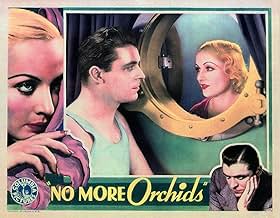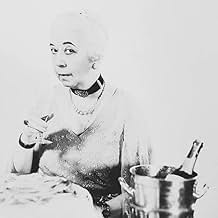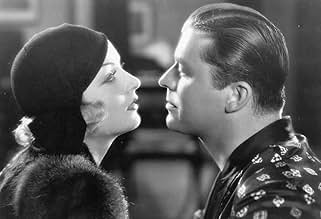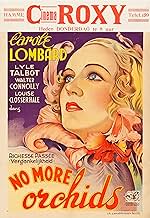Aggiungi una trama nella tua linguaAn heiress forced to marry into royalty in order to save her banker father falls in love with another man while on a cruise.An heiress forced to marry into royalty in order to save her banker father falls in love with another man while on a cruise.An heiress forced to marry into royalty in order to save her banker father falls in love with another man while on a cruise.
- Regia
- Sceneggiatura
- Star
Sidney Bracey
- Holmes
- (non citato nei titoli originali)
Belle Johnstone
- Housekeeper
- (non citato nei titoli originali)
Edward LeSaint
- Capt. Jeffries
- (non citato nei titoli originali)
Wilfred Lucas
- Banker
- (non citato nei titoli originali)
Charles Hill Mailes
- Merriwell
- (non citato nei titoli originali)
Harold Minjir
- Modiste
- (non citato nei titoli originali)
Broderick O'Farrell
- Benton -- Butler
- (non citato nei titoli originali)
William Worthington
- Cannon
- (non citato nei titoli originali)
Recensioni in evidenza
This is one of Carole Lombard's best early films. It goes a long way to sort of proving that it was Harry Cohn and Columbia Pictures, not the actress's home studio Paramount, that gave her the chance to shine most. The casting in this picture is flawless-- Lyle Talbot turns in a surprisingly good performance as the romantic interest and generates a lot of chemistry with Lombard; C. Aubrey Smith is letter-perfect in his villainous role as the tyrannical grandfather; and both Louise Closser Hale as the charming grandmother and Walter Connolly as the financially- troubled father give the story its heart and soul. Even the smaller roles (the catty rival, and the European prince) are filled by capable performers. But it's the story that captivates the viewer. An opposites-attract romance, it combines elements of comedy and melodrama, moves briskly and is very entertaining. For a product from a then-poverty row studio, this Columbia Pictures release is as sharp and polished as anything that came out of MGM or Paramount at this time. Highly recommended and worth seeing!
Carole Lombard was loaned from Paramount to Columbia to star in No More
Orchids in which she plays a spoiled heiress, not unlike the one she played in her
later classic My Man Godfrey.
She lives pretty high on the hog, but the pig is about to be slain as this is the Great Depression and the bank that her father Walter Connolly heads is about to go belly up. Her grandfather C. Aubrey Smith does not like his son-in-law.
But he does like his granddaughter and he wants Lombard to marry some empty suit with a title. He fancies being in-laws to nobility. He's got the empty suit picked out. but Lombard wants to marry lawyer Lyle Talbot.
In the end it's Connolly who makes the sacrifice so that Lombard can live her life with whom she loves. Won't say how.
Good performances all around. The revelation here is C. Aubrey Smith who usually plays stern but upstanding upper crust types is a real no good in this one. Good but way off type for him.
She lives pretty high on the hog, but the pig is about to be slain as this is the Great Depression and the bank that her father Walter Connolly heads is about to go belly up. Her grandfather C. Aubrey Smith does not like his son-in-law.
But he does like his granddaughter and he wants Lombard to marry some empty suit with a title. He fancies being in-laws to nobility. He's got the empty suit picked out. but Lombard wants to marry lawyer Lyle Talbot.
In the end it's Connolly who makes the sacrifice so that Lombard can live her life with whom she loves. Won't say how.
Good performances all around. The revelation here is C. Aubrey Smith who usually plays stern but upstanding upper crust types is a real no good in this one. Good but way off type for him.
NO MORE ORCHIDS is just a little programmer movie but it's an incredibly elegant one. Columbia studios in the early 1930's was thought of as something as a poverty row studio yet this film looks as slick and expensive as any potboiler the more uptown MGM or Paramount might have produced.
Carole Lombard stars as a spoiled society girl who is engaged to a prince in a marriage arranged by her controlling grandfather C. Aubrey Smith. On the ocean-liner back to America, she falls in love with white collar worker Lyle Talbot (who in her pampered world qualifies as "penniless") and eventually breaks his cool barrier. Lombard's pal of a dad, Walter Connally, and paternal grandmother Louise Closser Hale are crazy about Talbot but mean old grandpa Smith is not about to let his plans fall through, having seen his own late daughter marry "beneath" her.
Carole Lombard is superb as the frivolous but good-hearted socialite and she surprisingly is matched by Lyle Talbot, one of the era's reliable but usually bland leading men; in this picture, Talbot exhibits a sex appeal seldom tapped in the scores of bread-and-butter pictures he cranked out. Connally is very good in one of his first movie roles as father to a screwball romantic comedy queen (although this picture ventures more toward soap opera "women's picture" despite some nice comedy bits). Talented character player Louise Closser Hale seems a bit miscast, she's a bit too cutesy and lacks the saltiness a May Robson might have brought to the part. Smith essays a rare villainous part in a rather brief but pivotal role. Ruthelma Stevens and the very cute Allen Stevens have the only other somewhat featured parts as two of Lombard's good-time buddies in the society crowd; these small parts are among the larger ones for each of them, as they generally played bits.
Lombard is so strikingly beautiful and assured in her performance here it's hard to believe she was little more than a starlet at the time and not yet a major Hollywood star. She is sensationally photographed, although one scene makes her facial scar from an early car wreck more visible than I've ever seen it in one of her films. NO MORE ORCHIDS is just another Hollywood movie but it moves quickly and smoothly and is well worth your time if you love films from the 1930's.
Carole Lombard stars as a spoiled society girl who is engaged to a prince in a marriage arranged by her controlling grandfather C. Aubrey Smith. On the ocean-liner back to America, she falls in love with white collar worker Lyle Talbot (who in her pampered world qualifies as "penniless") and eventually breaks his cool barrier. Lombard's pal of a dad, Walter Connally, and paternal grandmother Louise Closser Hale are crazy about Talbot but mean old grandpa Smith is not about to let his plans fall through, having seen his own late daughter marry "beneath" her.
Carole Lombard is superb as the frivolous but good-hearted socialite and she surprisingly is matched by Lyle Talbot, one of the era's reliable but usually bland leading men; in this picture, Talbot exhibits a sex appeal seldom tapped in the scores of bread-and-butter pictures he cranked out. Connally is very good in one of his first movie roles as father to a screwball romantic comedy queen (although this picture ventures more toward soap opera "women's picture" despite some nice comedy bits). Talented character player Louise Closser Hale seems a bit miscast, she's a bit too cutesy and lacks the saltiness a May Robson might have brought to the part. Smith essays a rare villainous part in a rather brief but pivotal role. Ruthelma Stevens and the very cute Allen Stevens have the only other somewhat featured parts as two of Lombard's good-time buddies in the society crowd; these small parts are among the larger ones for each of them, as they generally played bits.
Lombard is so strikingly beautiful and assured in her performance here it's hard to believe she was little more than a starlet at the time and not yet a major Hollywood star. She is sensationally photographed, although one scene makes her facial scar from an early car wreck more visible than I've ever seen it in one of her films. NO MORE ORCHIDS is just another Hollywood movie but it moves quickly and smoothly and is well worth your time if you love films from the 1930's.
Rather schizophrenic comedy-drama from post-Prohibition but pre-Hays Code, meaning Carole Lombard gets to strut around in her flimsies, make prurient wisecracks, and be not the least timid about getting what she wants. She's a rich girl with a bumbling banker dad (Walter Connolly, playing virtually the same role as a year later in "It Happened One Night") and an aren't-I-adorable grandma (Louise Closser Hale, trying to be May Robson) who falls for unrich Lyle Talbot (a perfectly OK leading man, who looks a bit like the pre-mustachioed Gable, and has some of the Gable swagger). Why her awful grandpa would insist on her marrying somebody else isn't clear, nor is it clear why the sacrifice at the end makes everything all right. But ignore the plot and enjoy the ribald ripostes, and, especially, Carole looking gorgeous and wriggling around with great vivacity. She has star quality, but beyond that, she's a real actress, and you'll notice how carefully she's building and sustaining a not-always-likable character. Fine work.
Grace Perkins, the author of this story also wrote MY PAST and NIGHT NURSE which were both big impact, big juicy dramas for Warner Bothers around this time as well. This picture has that same strong narrative, a well-crafted sense of direction and an empathy with the charismatic leads. The characters feel like real people, they work well together and develop together. When however you stand back and look at the family to which Carole Lombard's character belongs you have to admit that such a family could only ever exist in fiction, they are a little ridiculous but because they're acted so well with such authenticity, you've abandoned your sense of reality ages ago. One of the reasons it all seems so believable is because for the first half of the film it's a kind of light comedy and the way your mind accepts such something like that is less critical than if it were a tough drama. By the time the film switches from comedy to tragedy (or rather something a bit more dramatic) your mind is fully engaged; a common but still clever little trick.
In essence, it's about a rebellious young heiress (yes, another one!) who rather unsurprisingly falls for the wrong guy (yes, it is that predictable). That's how the film hooks you in, using a familiar story peppered with good witty writing and convincing performances. About half way through it starts to get down to business but still retains that lightness and humour - mainly down to the Granma (played by Louise Closer Hale) who is brilliant...... and so is Walter Connolly (was it in his contract that every father in every Columbia picture of the early 30s had to be played by him?) and so is Carole Lombard (genuinely funny and lovely without doing all that annoying screeching she did in her later films). They're all so good - they're 'proper actors!' And I know I left Lyle Talbot out of that list..... he's not a bad actor he's just incredibly dull. Why would someone as bubbly and vivacious as Carole Lombard's Annie fall for the dullest man in America?
In summary, this is a really worthwhile way to spend an hour and a half if you enjoy a better than average early thirties drama with a splash of comedy thrown in. It's made by Columbia which was not known for its extravagant production budgets but this one feels as classy as anything MGM might have made. It's not got a deep message, it isn't one of those a Warner Brothers/Zanuck movies that will make you angry and want to change the world but it's engaging and good fun.
In essence, it's about a rebellious young heiress (yes, another one!) who rather unsurprisingly falls for the wrong guy (yes, it is that predictable). That's how the film hooks you in, using a familiar story peppered with good witty writing and convincing performances. About half way through it starts to get down to business but still retains that lightness and humour - mainly down to the Granma (played by Louise Closer Hale) who is brilliant...... and so is Walter Connolly (was it in his contract that every father in every Columbia picture of the early 30s had to be played by him?) and so is Carole Lombard (genuinely funny and lovely without doing all that annoying screeching she did in her later films). They're all so good - they're 'proper actors!' And I know I left Lyle Talbot out of that list..... he's not a bad actor he's just incredibly dull. Why would someone as bubbly and vivacious as Carole Lombard's Annie fall for the dullest man in America?
In summary, this is a really worthwhile way to spend an hour and a half if you enjoy a better than average early thirties drama with a splash of comedy thrown in. It's made by Columbia which was not known for its extravagant production budgets but this one feels as classy as anything MGM might have made. It's not got a deep message, it isn't one of those a Warner Brothers/Zanuck movies that will make you angry and want to change the world but it's engaging and good fun.
Lo sapevi?
- QuizWalter Connolly (Bill Holt) and Jameson Thomas (Prince Carlos) would again play a father and his prospective son-in-law in Accadde una notte (1934).
- Blooper(at about 6 mins) When Anne Holt is told to take off her dress, she is clearly not wearing a bra. Two edits (six seconds) later, Anne is seemingly struggling to pull her dress below her hips while wearing a bra, which she would not have had time to put on while simultaneously removing her dress.
- ConnessioniReferences The Poor Little Rich Girl (1917)
I più visti
Accedi per valutare e creare un elenco di titoli salvati per ottenere consigli personalizzati
- How long is No More Orchids?Powered by Alexa
Dettagli
- Data di uscita
- Paese di origine
- Lingua
- Celebre anche come
- La consentida
- Luoghi delle riprese
- Wall Street, Manhattan, New York, New York, Stati Uniti(establishing shot for the Banker's Club scene)
- Azienda produttrice
- Vedi altri crediti dell’azienda su IMDbPro
- Tempo di esecuzione
- 1h 18min(78 min)
- Colore
- Proporzioni
- 1.37 : 1
Contribuisci a questa pagina
Suggerisci una modifica o aggiungi i contenuti mancanti





































